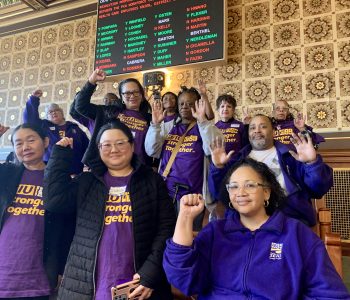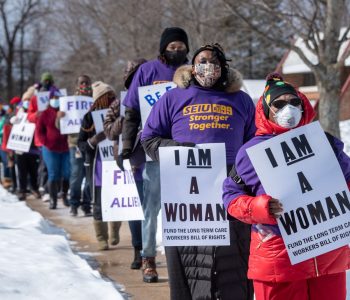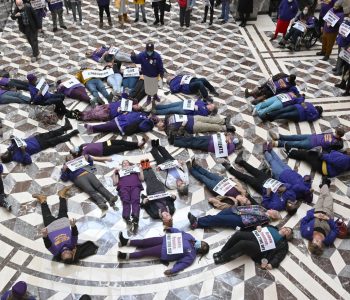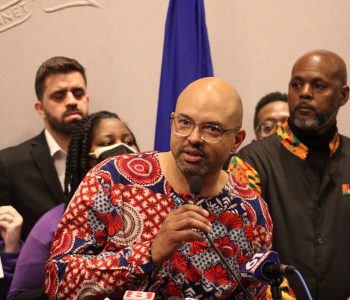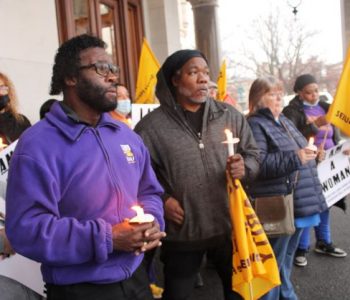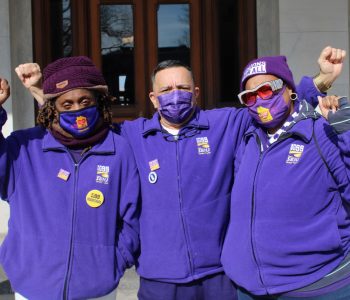 Home Care
Home Care
This afternoon, February 2nd at 3pm, Personal Care Attendants (or PCAs) were joined by
legislators and labor leaders to discuss the challenging, even desperate, conditions for home
care workers who take care of individuals with disabilities in their homes, empowering them to
live independently and empowering the families of individuals with disabilities to continue
working full-time.
Rob Baril, president of SEIU 1199, opened the Zoom press conference. He said, “This is a
workforce that is trapped in poverty. Many folks are uninsured and are working in conditions that
are quite desperate, through two years of a pandemic. These conditions are determined by the
State of Connecticut.”
Baril said, “PCAs have no health insurance, no ability to retire, and no sick days. In the course
of the past two years, they have performed an act of love in caring for those who cannot care for
themselves. Our members have been sickened, have incurred tens of thousands of dollars of
medical debt, and have gone without medical care and developed life-threatening medical
issues. These workers are overwhelmingly female, and majority Black, Brown, and White
working-class. This is a historic opportunity for the governor and the legislature to do the right
thing. They can lift up the workers; they have the direct opportunity to change these peoples’
working conditions.”
SEIU 1199 distributed a survey to PCAs and received nearly 800 responses. The statistics
(outlined in the attached document) are disturbing. To name a few:
● 50% of PCAs have taken unpaid time off during the past 6 months due to illness or
quarantine
● 26% of PCAs have unpaid medical debt; nearly 1 in 5 have more than $1,000 in unpaid
medical debt
● 32% of PCAs have been behind on rent or a mortgage payment in the past year.
● 42% of PCAs have paid late fees or have been in collections for unpaid bills in the past
year.
● 37% of PCAs rely on food stamps.
● 33% of PCAs say they’ve been unable to afford groceries or had enough food for their
families in the past year.
Representative Hilda Santiago said, “I am shocked at these numbers. They’re incredible. In a
rich state like Connecticut, we have people in the same poverty cycle over and over again. We
need to bring these numbers to the legislature. We need to make sure that the PCAs and 1199
get a fair contract. It’s inexcusable that we still have people who can’t pay their rent, they’re
getting shut off notices, they don’t have health care because they’re not able to afford it. We
need to do something about this. We need to… fight to get a fair contract.”
For Santiago, the issue is personal: “Our population is getting older. We need people to do
home care. My mother gets home care. She gets a PCA twice a week to help her do what she
needs to do to have a better quality of life…. I commit to fight to make sure this contract goes
through…. They shouldn’t be on food stamps. They should be getting paid well enough to not
be using the system.”
We heard stories from PCAs themselves:
A year after having a heart attack, Meriden PCA Israel Alvarado has no health insurance
and is rationing his life-saving heart medications for which he pays out of pocket. He lost
3 ½ weeks of pay last month when he had COVID-19, and without paid sick leave his car
note may go into forbearance, which he relies on to get to work. “You either stop work
and live off the system, or you work 2-3 jobs to make ends meet. At the end of the day
all we’re trying to do is survive.”
New Haven PCA Faye Hargrove has been a home care worker for 30 years, and works
3 jobs. When she got COVID in October, she spent a week in the hospital, lost $1800 in
income, and now has $7000 in medical bills. She is being harassed by creditors; the gas
company is threatening to shut off her heat; and she relies on her daughter to help her
buy groceries when she can’t afford them.
Isaac Kolonziaa, a PCA from South Windsor, works 24-hour shifts as a live-in PCA for a
patient who requires total care. For this, he earns $170 for a 24-hour period, or less than
minimum wage per hour. Isaac has no health insurance, and owes an $8000 emergency
room bill after having an adverse vaccine reaction. “I’m doing 3 peoples’ jobs, and
making less than minimum wage. If things don’t get better, I will have to leave and find
another job.”
Jannell Roberts cares for a West Haven Consumer-Employer. When her Consumer
came down with COVID, she fell sick soon after. But because her Consumer has no
access to backup caregivers, and because Jannell does not receive any paid sick days,
she continued working through her own illness to make sure her Consumer was able to
get out of bed each day.
Nicole Bongiovanni, a Madison PCA, has spent much of her career working 70 hours a
week, without health insurance. Last summer, she had a heart attack and spent 3 days
in the hospital. She now has a $25,000 bill she cannot pay. Months later, she
contracted COVID, and feared needing medical care. “I can’t pay the bill I have and I’m
terrified of getting more bills I can’t pay. We give our consumers independence, but I
can’t even look forward to a future free of debt.”
Nichelle McCoy is a PCA from Bridgeport whose consumer has become like family.
“When my consumer needs something, she doesn’t call her family; she calls me. I want
to stay in home care, but I feel I’m being forced to leave because I can’t survive. Both
my daughters have chronic medical conditions, and I have a $4500 bill from January
alone and no health insurance myself. I’m planning to declare bankruptcy because I see
no other choice.”
Senator Derek Slap addressed the group of over one hundred PCAs who joined the meeting.
“Health care is a human right, not a privilege. It’s backwards-looking for the state. Morally, we
need to have everybody have health care… My mother was a geriatric nurse, she was a single
mom. You struggle, you work your tail off, and not have basic health care. It’s unconscionable.
It’s incumbent upon all of us to be your voice and fight for you at the Capitol.”
Representative Jane Garibay also addressed the group. She said, “Everyone deserves
housing, education, health care, and a living wage… Let’s remind our legislators and the public
that, at some time, we will soon be there. PCAs will be taking care of us, whether it’s at home,
in a nursing home, in assisted living. So I absolutely support better wages for personal care
assistants.”
State Senator Jorge Cabrera sees the urgency— on the Zoom call, he called the situation a
“crisis.” Cabrera said, “We need to continue to fight to make sure that all PCAs have what they
need. You all are professionals. That’s part of the problem. If we’ve learned anything from
COVID, it’s that we have really large gaps in our health care infrastructure. We’ve gotta ask
ourselves, What kind of state do we really want to be? Do we want to be a state where people
who work in very difficult jobs are not compensated well enough to have a living wage, who
don’t have the money to retire? It is unconscionable. We have an opportunity now.”
Cabrera referenced Governor Lamont’s recent announcement around the state’s surplus and
flush rainy day fund. Cabrera said, “We have a lot of money in the state of Connecticut. The
rainy day fund is overflowing. We really have an opportunity in Connecticut to decide what it
looks like for men and women working post-COVID. We cannot pass up this opportunity.
Sometimes we don’t do structural change until there’s a crisis. Well, there’s a crisis.”
SEIU 1199 calls upon the legislature to approve a drastically improved contract for state-funded
PCAs. We are asking Governor Lamont to support PCAs and settle a contract with paid sick
leave, retirement benefits, and health insurance. This is a crisis and it cannot wait.
Contact: Diedre Murch, Home Care Director & Vice President
SEIU 1199 New England
(203) 444-2528
dmurch@seiu1199ne.org
